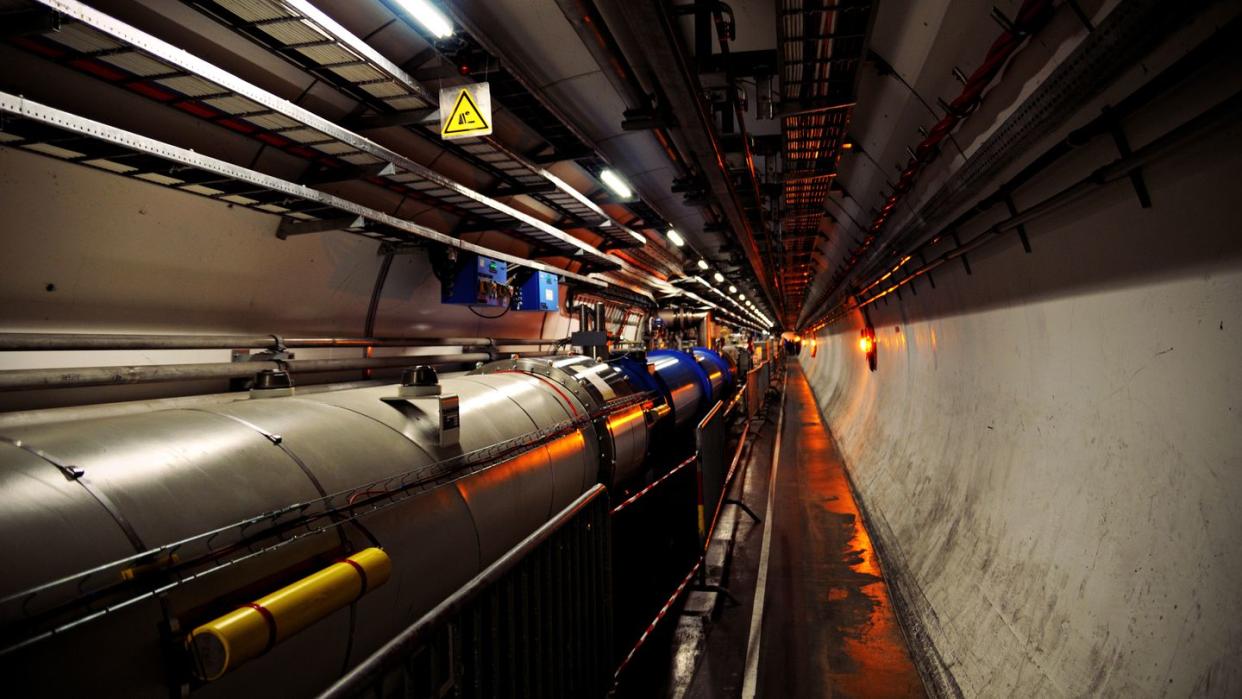Humanity’s Quest to Find New Physics Hinges on a Controversial Particle Smasher

"Hearst Magazines and Yahoo may earn commission or revenue on some items through these links."
The European Organization for Nuclear Research, CERN, has put a $21.5 billion price tag on its proposed Future Circular Collider.
At more than three times the size of the current Large Hadron Collider, scientists say it is needed to create a more powerful accelerator.
Proponents say the possibilities of a sizable collider are too great to understand, but opponents are concerned about the intimidating financial costs.
The Large Hadron Collider still has experiments scheduled into 2040, but CERN—the European Organization for Nuclear Research—already has plans to iterate on the LHC and making something much bigger: the Future Circular Collider.
And bigger might be an understatement.
The proposed $21.5 billion Future Circular Collider (FCC) would “push the energy and intensity frontiers of particle colliders, with the aim of reaching collision energies of 100 TeV, in the search for new physics,” CERN wrote. Expected to have a 56-mile circumference, compared to the 16.5 of the LHC, it would be able to handle energy levels about seven times those of the LHC.
“The FCC will not only be a wonderful instrument to improve our understanding of fundamental laws of physics and of nature,” CERN director general Fabiola Gianotti said during a briefing, according to the Financial Times, “it will also be a driver of innovation.” Much like the LHC before it.
The LHC, an underground circular tunnel near the border between Switzerland and France, started smashing subatomic particles together at nearly the speed of light in 2008. The force it generates is greater than anywhere else in the world, and it allows scientists to study extremely hard-to-observe collisions. In 2012, the LHC helped confirm a 1964 theory about the existence of a fundamental particle called the Higgs boson, a.k.a. the “God particle.” And while there hasn’t been a monumental breakthrough of that magnitude in the last decade, the world’s largest collider is an ongoing lab for physics experiments that simply wouldn’t be possible if the collider didn’t exist.
But even the LHC has its limits. For those physicists who believe colliders can potentially teach us about things like dark matter or about how particles gain mass, the LHC just might not be hefty enough to do the job. That’s where the FCC steps in—three times larger and seven times more powerful.
The FCC, carved deeper underground in the same region, would be built in two phases. The first would begin colliding electrons together in the 2040s. If all goes well, the second phase could begin smashing protons in the 2070s, using powerful magnets not yet invented. All of this would open up a fresh wave of potential experiments.
While it’s almost all upsides in the world of physics, the FCC does have its downsides—namely, its financial cost. The $21.5 billion is just for construction, and doesn’t account for things like operational expenses.
Proponents say that’s the price for science, but not everyone is on board. David King, a former UK government chief scientific advisor, told the BBC that spending that kind of money on the FCC is “reckless.” He believes that with so many other more pressing issues facing our world—such as the current climate emergency—research should focus on helping to manage our future.
Sabine Hossenfelder, of the Munich Center for Mathematical Philosophy, has a similar sentiment. She told the BBC that particle physics research has ballooned well beyond what’s needed—about 10 times the size of what it warrants.
But for those on the particle search, the FCC represents the gateway to the next frontier. “It is a tool that will allow humanity to make enormous steps forward in answering questions in fundamental physics about our knowledge of the universe,” Gianotti said, according to the BBC. “And to do that we need a more powerful instrument to address these questions.”
We’ll soon see if officials decide that the potential benefits outweigh the costs.
You Might Also Like
